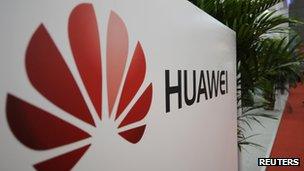Viewpoint: China's new corporate champions
- Published

Joel Backaler says there is a new breed of Chinese company emerging
Is China capable of producing more than inexpensive manufactured goods? The answer, increasingly, is 'yes.'
In 2011, China's exports consist of more than consumer products like toys, shoes and clothing - the Middle Kingdom is exporting world-class technology through a new breed of multinational companies.
Regardless of whether it is Haier in the consumer goods area, Huawei in the technology space, or Mindray in the healthcare sector - Chinese companies are making a growing name for themselves in developed markets like Europe and the United States.
Due to comparatively low labour costs and their increasing technological prowess, these firms are willing to offer lower prices for high quality goods and services.
Perception versus Reality
The global economic downturn presented these Chinese companies with a unique opportunity to capture market share as global consumers increasingly prioritised value for money. Western multinationals have limited time to adapt their strategies and regain their momentum before these new competitors can further consolidate their presence in key markets.
Chinese companies are perceived by some as opportunistic firms with a "land-grab" mentality that lacks well thought-out long-term strategy. Western executives often cite the large scale investments by Chinese companies in Africa's resources sector as an example of this type of behaviour.
These same executives also argue that Chinese companies' fast growth will likely not be sustainable in the longer term due to their short-sighted business practices. In reality though, there is another side to the story in which Chinese companies have been developing local innovations that are suited for their home country but can also be adapted for overseas markets to boost ongoing growth.
So what makes some of these new Chinese companies tick?
Huawei: grow with your customers

One example is Huawei Technologies. Huawei is headquartered in Shenzhen, China, close to Hong Kong.
The company is a leading provider of telecommunications solutions with nearly 40,000 employees at over 100 global locations and in excess of $18bn of annual revenue.
Sceptics argue that Huawei is just a low-cost competitor. While prices for its services are typically 20-30% cheaper than those of comparable Western multinationals, Huawei stresses that it provides the best value as it offers more customised services for less.
Huawei's willingness to customise products for clients and collaborate with them over the long-term is a key differentiator. Through these long-term partnerships, Huawei has successfully positioned itself to grow with its clients. For example, as 3G has taken off in Turkey with Vodafone and Turkcell, so has Huawei - it had less than 100 employees in Turkey in 2008 and now has more than 500.
Haier: local innovations worldwide
Headquartered in China's Shandong Province, Haier is a producer of consumer appliances such as refrigerators, washing machines and air conditioning units. It has over 50,000 employees worldwide.
Haier's ability to innovate both in China and overseas is what separates it from Western multinationals like Electrolux, Whirlpool and GE. Haier has established eight Research & Development centres globally to develop products relevant to local consumers, such as extra-wide refrigerators for large households in Pakistan where women's average height is shorter, smaller-sized washing machines in Japan where family size is typically smaller, and mini-refrigerators in the United States for college students.
Mindray: different brands for different markets
One Chinese company successfully marketing to consumers in both emerging and developed markets is Mindray.
Mindray is a medical devices company with global offices in cities like London, Amsterdam, Frankfurt, Istanbul, Mexico City, Sao Paulo and Toronto. The company has been expanding aggressively worldwide, helped by more than 1,000 exclusive distributors and close to 1,000 sales personnel. Mindray's success lies in its ability to be different things to different groups of consumers.
In emerging markets, where consumers have less money to spend on medical care than their counterparts in developed nations, Mindray markets itself with the slogan "Wellness Within Reach" - implying that its products are affordable for local consumers without much discretionary spending power.
However, with nearly a third of Mindray's revenues coming from developed markets like the European Union and the United States, Mindray also markets itself as a global brand. Most recently it has been using a new logo taken from its acquisition in March 2008 of US-based Datascope Monitoring.
Such global brand positioning allows it to go head-to-head with Western competitors like Roche, Johnson & Johnson and Siemens.
New champions for a new era
Chinese companies have historically been characterised as low-cost, low-quality producers of manufactured goods.
However, as the examples of Huawei, Haier and Mindray demonstrate, it's clear that a new breed of Chinese company is emerging that is able to compete on the world stage.
These Chinese multinationals are able to innovate locally to serve the needs of consumers in both emerging and developed markets.
They can also be more flexible offering customised solutions to better meet customer needs, fostering long-term relationships which can lead to continued growth.
Today there are still only a handful of truly global Chinese companies making a name for themselves overseas.
At this stage companies like Haier, Huawei and Mindray are the exception and not the rule. It seems certain, however, that there will be more global players coming out of China in the years ahead.
Joel Backaler is the author of TheChinaObserver.com, external, an award-winning China business blog
- Published11 December 2011
- Published9 December 2011
- Published24 November 2011
- Published27 November 2011
- Published17 April 2011